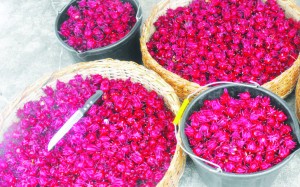The Sorrel Pilot Project, aimed at exporting the high in demand fruits to overseas markets and providing much needed revenue to rural communities, has been expanding rapidly across the country.
Child psychologist Dr Faith Harding, who is the mastermind behind the project, told Guyana Times International on Monday that the results of sorrel harvests in the initial target community have created a ripple effect and have seen an explosion of similar projects in rural areas.

She revealed that there are now sorrel farms in Corriverton, Berbice; Moraikobai, Mahaica, Region Five; Mocha Arcadia, East Bank Demerara; Lily’s Hideout, Linden Soesdyke Highway and West Watooka, Region 10.
According to Dr Harding, a farmer in Parika, East Bank Essequibo is preparing to take up the sorrel challenge during this week and the project will also move to Hampton Court on the Essequibo Coast where five acres of land are expected to be cultivated.
Catching on
“It’s definitely catching on,” an upbeat Harding said during a telephone interview.
The combined communities have reaped more than 2000 pounds of the fruit from September 2012 to present.
Farmers at Long Creek on the Linden/Soesdyke Highway, the initial project site, have been instrumental in reaping the bulk of the sorrel harvest, despite having irrigation problems.
Harding said that the community has already discussed the feasibility of digging a well to address their irrigation needs.
“We have learnt quite a lot from this pilot about this fruit; that sorrel grows in any type of soil and grows all year round.”
The group is still working to attract donor funds, but government has since provided technical assistance through the National Agricultural and Research Extension Institute (NAREI).
According to Dr Harding, the group is looking at providing 4000 tons of preserved sorrel to the Mexican market and has been storing the dried fruit. She is confident that this proposed target can be attained during the final quarter of this year.
“So it’s a lucrative market and it’s building on Guyana’s foreign exchange revenue. This for me is a great joy to have farmers who have land that was underutilised or not used at all to grow a product that is easily done. Here we will have people making lots of money and that is my reward,” a jubilant Dr Harding related.
The sorrel project, launched under the Quick Impact Programme (QIP), is aimed at leading communities out of poverty through a collaborative effort of self-help and technical assistance. Coordinator of the Long Creek Project, Michael De Abreu described the project as “fruitful and feasible”, stating that it was very beneficial to the community as a means of ensuring the sustainability of future generations.




